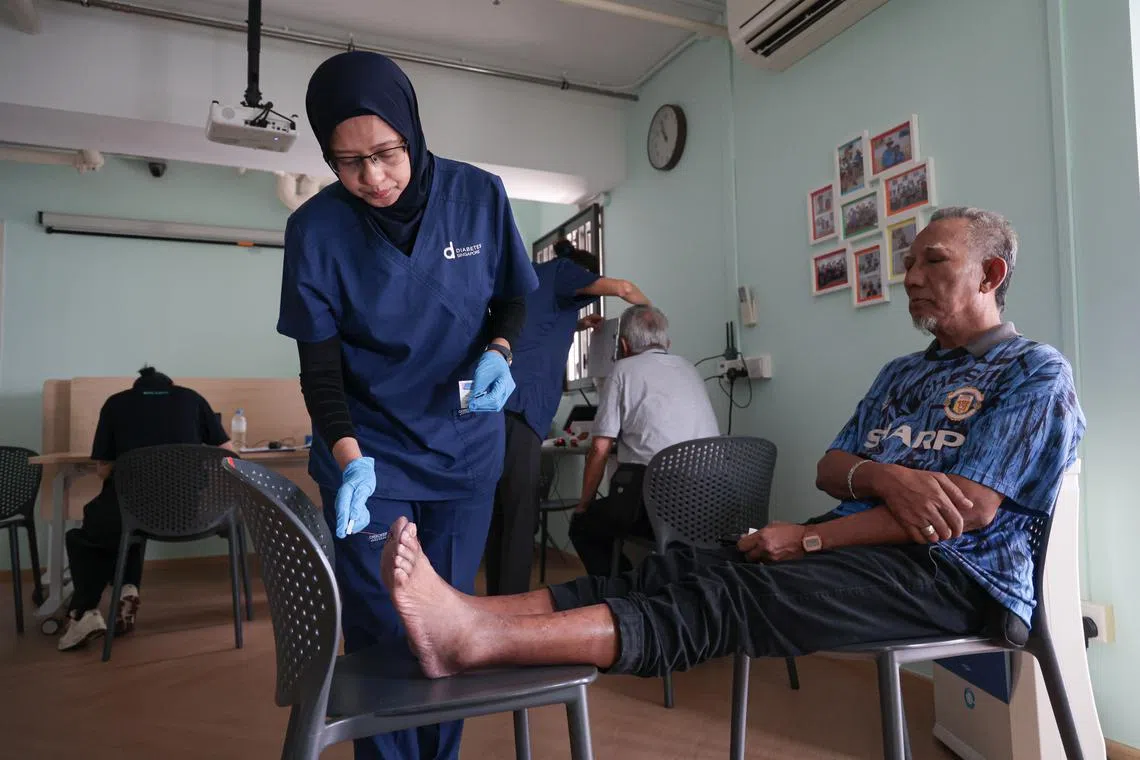NHG Health brings screening for diabetes-related complications closer to community
Sign up now: Get ST's newsletters delivered to your inbox

Retired security officer Mohamed Surip Jurimi (right) undergoing diabetic foot screening at the NTUC Health active ageing centre at Kampung Admiralty on July 17.
PHOTO: LIANHE ZAOBAO
Follow topic:
SINGAPORE – People with diabetes living in northern and central Singapore now have greater access to screenings for earlier detection and management of diabetes-related complications.
NHG Health – formerly known as the National Healthcare Group – runs an initiative allowing diabetic patients to go for foot screenings and retinal photography services at locations closer to their homes, such as community clubs, active ageing centres and residents’ networks.
Since the initiative began in November 2023, about 770 patients have been referred to 12 such screening sites, said Dr Christopher Chong, primary care office director at NHG Health’s population health campus.
He told reporters on July 17 the sites were chosen for their proximity to 92 general practitioner (GP) clinics under NHG Health’s Central-North primary care network, a national programme that allows doctors to share resources.
The 12 sites include the NTUC Health Active Ageing Centre in Kampung Admiralty, the Cheng San and Serangoon community clubs, and the Toa Payoh View residents’ network.
“The community sites are much closer to the patients’ homes, so they are more accessible and more convenient for them,” said Dr Chong, who is also administrative lead for NHG Health’s primary care network, which includes 226 GP clinics.
At these locations, patients who are prone to foot-related complications can undergo diabetic foot screening.
This involves inspecting the patient’s feet for abnormalities or deformities as well as testing the ability of the feet to feel sensations to check for nerve damage.
They will also undergo diabetic retinal photography, where a special camera is used to capture high-resolution images of the retina to identify early signs of damage caused by diabetes.
Such patients are prone to blindness due to diabetic retinopathy – a condition where blood vessels in the retina are damaged because of diabetes, causing vision loss.
Diabetics should go for such screenings annually, said Dr Chong.
Diabetes is a leading cause of blindness in Singapore, with about 33.9 per cent of patients experiencing diabetic retinopathy.
In addition, about four people in Singapore each day face having their lower limbs amputated because of diabetic wounds, with about 1,500 such amputations performed annually.
Patients who undergo screenings at these community sites will also be counselled on how to manage their diabetes, and be linked to relevant community resources and programmes based on their individual needs.
While such screenings are currently conducted at GP clinics and in buses dedicated to such screenings parked near these clinics, these locations have constraints, Dr Chong said.
For example, GP clinics may not have the space needed to provide such services, while buses may not have a suitable parking space.
Therefore, community sites are needed to augment these locations, he said, noting that the cost of these screenings is subsidised and comparable with those at polyclinics.
NHG Health said it intends to establish at least one such community screening location near each cluster of GP clinics under its primary care network by 2026.
Retired security officer Mohamed Surip Jurimi, who was diagnosed with diabetes two years ago, said such sites make screenings more convenient.
Whereas he used to travel to a clinic about 2km away for his screenings, he can now go to the NTUC Health Active Ageing Centre in the Kampung Admiralty integrated development, where he lives.
“It’s much easier for me,” the 68-year-old said.
Associate Professor Karen Ng, director of NHG Health’s Central-North primary care network, said: “Early screening for diabetic foot and eye complications is key to timely intervention and preventing serious issues such as lower limb extremity amputations and diabetic retinopathy.”
“By partnering with GPs in our Central-North primary care network and active ageing centres, we have brought such screenings much closer to the community, at patients’ convenience,” added Prof Ng, who is also primary care chief at NHG Health’s population health campus.
In Singapore, more than 400,000 people live with diabetes, a number expected to reach one million by 2050.


